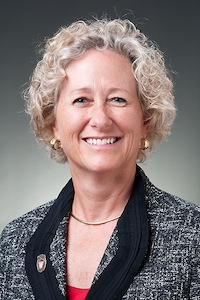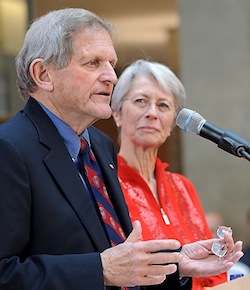Summit celebrates community-engaged learning, research
For University of Wisconsin–Madison student Chloe Brown, taking the stage at the Morgridge Engaged Scholarship Summit isn’t just an opportunity to present the results of her research on mentorship.
Brown, now a senior majoring in legal studies and sociology (with certificates in global health and gender and women’s studies), has transferred connections made in childhood to her work in the classroom. Thanks to a grant administered by UW–Madison’s Morgridge Center for Public Service, Brown found that she could serve her community even as she stepped back to ask critical research questions about the impact of her work.
Since 2010, the Morgridge Matching Grant fund — set up by UW–Madison alumni John and Tashia Morgridge — has encouraged dozens of students, faculty and staff in their community-based research and service learning courses.
On Wednesday, March 20, the Morgridge Center celebrates this effort with the Morgridge Engaged Scholarship Summit, held from 11:30 a.m. through 4:30 p.m. in the Town Center of the Wisconsin Institutes for Discovery. The event is free and open to the public, but registration is required.
The summit highlights 38 projects funded by Morgridge Matching Grants since 2010, as well as the specific connections between academics and service. A morning poster exhibit and an afternoon presentation of “TED Talks” will spotlight the ways in which these projects have helped to narrow the gap between campus and community.
The Morgridge Matching Grant Program grew out of a twofold challenge from the Morgridges. Though they had already funded the Morgridge Center for Public Service in 1996, the couple wanted to help build its endowment while supporting faculty and staff in engaged scholarship. For every dollar brought into the Morgridge Center through its own gifting and granting, the program matches that grant with money placed in the center’s endowment.
Heading into the program’s fourth year (of five), Nancy Mathews, director of the center, wanted to honor grant recipients by sharing each project’s impact.

Mathews
“Community-based scholarship is often mistakenly viewed as pure service,” says Mathews, also a professor in the Nelson Institute for Environmental Studies. “As a faculty member, recently serving on a divisional tenure committee, I’m concerned that community-based learning and community-based research are undervalued [by pre-tenure scholars].”
Mathews says that the close collaboration among community, faculty and students that community-based scholarship requires make it seem markedly more difficult than other types of scholarly work. But she notes that it can also lead to greater impacts on its community partners.
“The Morgridge Match program has made a huge difference by supporting engaged work that otherwise might not have been funded,” says Mathews. “We hope that the continued success of all of our collaborators builds a community of scholars around the scholarship itself.”
The summit’s afternoon presentations come from multiple disciplines, reflecting
UW-Madison’s broad interest in the program: all schools and colleges, with one exception, have received a grant. Successful proposals have united faculty, staff and students with community partners in a way that builds trust and respect among all participants.
Chloe Brown is one of three collaborators who will speak alongside Boyd Rossing, an emeritus professor of interdisciplinary studies in the School of Human Ecology. Growing up, Brown and her family participated in Family Voices, a partnership with the Boys and Girls Club of Dane County encouraging African-American families to drive culturally relevant improvements in their neighborhoods. Rossing used a 2011 Morgridge Matching Grant to hire a seminar leader for Family Voices mentoring sessions.
Graduate seminar leader Marian Slaughter convened UW–Madison student-mentors after each session to discuss what worked for, and challenged, each individual mentee. Sharing their reflections with peers, the students could engage in joint problem solving and examine larger contexts to see what else might be going on in their mentees’ lives.
“The idea is to get involved with people and bring along your ’inquiring hat’ so you’re engaged. It’s a back-and-forth between interacting, trying to be of service, and then reflecting in a way that helps you see the bigger picture.”
Boyd Rossing
“We’re finding it’s not enough to look at complex social issues from a distance — and, unlike lab work done in the physical sciences, we can’t control the setting,” says Rossing. “The idea is to get involved with people and bring along your ‘inquiring hat’ so you’re engaged. It’s a back-and-forth between interacting, trying to be of service, and then reflecting in a way that helps you see the bigger picture.”
Learning principles and theories doesn’t automatically translate into effective practice. Rossing describes “two worlds”: seeing issues in new contexts off-campus, but perceiving an inability to bridge back to classroom theory.
“You have to make sense of what you’re hearing and seeing at the same time you have the theory in front of you. That’s why we’ve built in the ability to step back and reflect,” says Rossing. “When students go out to practice, hopefully they’re going to be able to bridge back to that theory instead of just stepping into the real world and out of academia.”
The seminar helped Brown build a more critical understanding of her own environment, including her work as a resident assistant in Sellery Hall.
“Every Saturday, after mentoring and tutoring, we’d talk about ways to improve relationships with our students, as well as ways to help each other,” says Brown. “That’s the important part: you’re looking at how you’re growing, but there’s no point if you don’t know how the individuals in the program are growing as well.”
Just as the Morgridge grants have helped sustain the work of UW–Madison students, faculty and staff, Brown is excited by her sustained connection with a project that has meant so much to her own life.
“People think that you’re not going to leave with anything after service work,” says Brown. “You have so much more appreciation for your communities. You’re more grateful for the people who help you. And hopefully our mentees and tutees will recognize that, too: it has to be a continuous cycle.”




